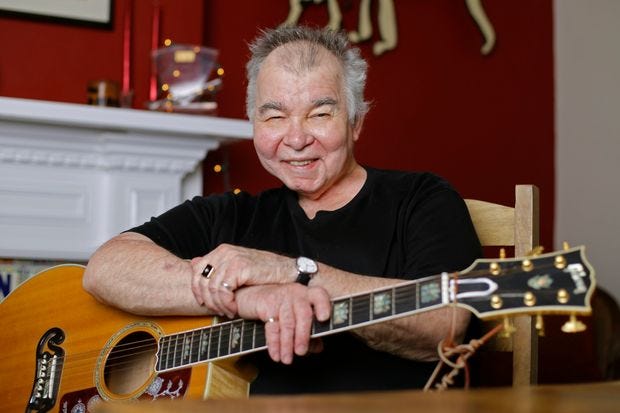
*Update — John Prine passed away Tuesday, April 7, 2020.
As some of you may have seen, there was an outpouring of support for John Prine in the last 48 hours by an incredibly diverse array of artist, from Joan Baez to Roger Waters, as news spread that he had been admitted to hospital in Nashville and was in critical condition due to the Coronavirus. As I write this, his wife, who had also contracted the virus, is now reporting that Prine is now in stable condition. It occured to me, though, that it’s highly likely that the name, John Prine, might not be familiar to many.
John Prine is a songwriter of enormous significance, across all genres of music, and many artists owe part of their popularity to his songwriting skills. His own performing career has always been slightly under the radar, for he is humble, quiet, and unassuming. But he’s like that faithful mailman, consistently delivering packages everyday that feel like presents on Christmas.
In fact, John Prine was a mailman in Chicago, singing in an out of the way club in Lincoln Park in October 1970 when a young film critic, Roger Ebert, stumbled into that club and heard him sing. He was so impressed he went back to his office at the Chicago Sun-Times and wrote this characteristically beautifully written review.What’s amazing to consider is that by then — Prine was 24 — he had already written so many songs that would become staples in many many singer’s repertoire. His self-titled album from 1971 has many of the songs that would be covered by so many.
In 1991, John Prine released The Missing Years on Oh Boy Records.
At The CD Store, where I worked, his album started really selling and we sbegan playing it with regularity. Prine has been called the “Mark Twain of American Songwriting,” and this is an apt description. His lyrics are simple and often really funny, but the story that’s being told is often a serious one and his songs have that timeless quality, in that their message continues to change as you age. It was also amazing to read that his back-up singers on this album included Bonnie Raitt, Tom Petty, and Bruce Springsteen. This was the type of respect he had from others in the music business. Listen to Bonnie Raitt’s version of Prine’s Angel From Montgomery that she recorded in 1974.
But I didn’t understand John Prine’s influence on other artists until 1993, when Nanci Griffith released her incredible cover album, Other Voices, Other Rooms.
Every single track on this album is perfection, but Prine’s song, The Speed of the Sound of Loneliness hits you right there.
So what in the world’s come over you. What in heaven’s name you done You’ve broken the speed of the sound of loneliness. You’re out there runnin’ just to be on the run.
The 2010 album, Broken Hearts and Dirty Windows, shows just how influential his songs have become. It’s a tribute album and artists from Justin Vernon to Sara Watkins sing Prine’s songs with their own unique style, yet Prine’s glint in his eye can be seen in every one of his words.
